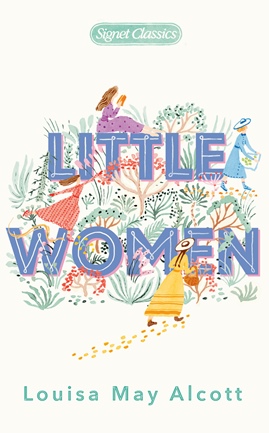Description
Louisa May Alcott shares the innocence of girlhood in this classic coming of age story about four sisters—Meg, Jo, Beth, and Amy.
In picturesque nineteenth-century New England, tomboyish Jo, beautiful Meg, fragile Beth, and romantic Amy are responsible for keeping a home while their father is off to war. At the same time, they must come to terms with their individual personalities—and make the transition from girlhood to womanhood. It can all be quite a challenge. But the March sisters, however different, are nurtured by their wise and beloved Marmee, bound by their love for each other and the feminine strength they share. Readers of all ages have fallen instantly in love with these Little Women. Their story transcends time—making this novel endure as a classic piece of American literature that has captivated generations of readers with their charm, innocence, and wistful insights.
This Signet Classics edition contains Little Women in its entirety, including Parts I and II.
With an Introduction by Regina Barecca
and an Afterword by Susan Straight
About the Author
Louisa May Alcott was an American novelist, short story writer, and poet best known for writing the novel Little Women (1868) and its sequels Good Wives (1869), Little Men (1871) and Jo's Boys (1886). Raised in New England by her transcendentalist parents,Abigail May AlcottandAmos Bronson Alcott, she grew up among many well-known intellectuals of the day, includingMargaret Fuller,Ralph Waldo Emerson,Nathaniel Hawthorne,Henry David Thoreau, andHenry Wadsworth Longfellow.Alcott's family suffered from financial difficulties, and while she worked to help support the family from an early age, she also sought an outlet in writing. She began to receive critical success for her writing in the 1860s. Early in her career, she sometimes used pen names such asA.M. Barnard, under which she wrote lurid short stories and sensation novels for adults that focused on passion and revenge.Published in 1868, Little Women is set in the Alcott family home, Orchard House, in Concord, Massachusetts, and is loosely based on Alcott's childhood experiences with her three sisters,Abigail May Alcott Nieriker, Elizabeth Sewall Alcott, andAnna Bronson Alcott Pratt. The novel was well-received at the time and is still popular today among both children and adults. It has been adapted for stage plays, films, and television many times.Alcott was an abolitionist and a feminist and remained unmarried throughout her life. She also spent her life active in reform movements such as temperance and women's suffrage. She died from a stroke in Boston on March 6, 1888, just two days after her father's death.
